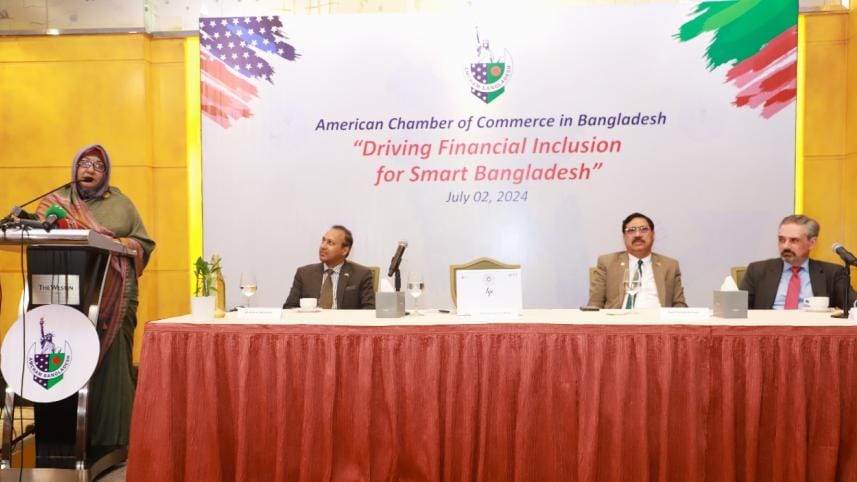Economic stability govt’s main focus: state minister for finance

The government will mainly focus on maintaining economic stability and promote education on science, scientific research and innovation to build a Smart Bangladesh by 2041, State Minister for Finance Waseqa Ayesha Khan said today.
For making a smart country, the government will also extend support to the agriculture sector to ensure food security, improve and expand basic health services and introduce training for the youth and the self-employed.
It will also put strong emphasis on using technology at all levels, including digitising all public services, optimising use of marine resources, ensuring discipline in the financial sector and ensuring conducive environment for setting up industries and investment.
In Smart Bangladesh, the per capita income will be at least $12,500, less than 3 percent of the population will be below the poverty line, extreme poverty will be reduced to zero and inflation will be limited to between 4-5 percent, Khan said.
Budget deficit will remain below 5 percent of the gross domestic product (GDP), the revenue-GDP ratio will be above 20 percent and investment will be 40 percent of GDP, Khan said.
The state minister made the comments while addressing a group of businessmen of Bangladesh and the USA at the monthly luncheon meeting of the American Chamber of Commerce in Bangladesh (AmCham), at the Westin Dhaka hotel.
"We will achieve 100 percent digital economy and science and technology-based literacy," she said.
Financial inclusion and easy access to financial services are regarded as an important prerequisite for poverty alleviation and boosting e-commerce, he said.
"Our government and financial institutions have been implementing numerous plans to encourage digital payments," she also said.
She said her government had set a target of achieving 30 percent of transactions in the cashless format by 2025 and 100 percent by 2031 at the first Smart Bangladesh Taskforce Meeting in August of 2023.
Bangladesh Bank has been implementing the National Financial Inclusion Strategy 2021-2026 with a mission to bring 100 percent people under financial inclusion by 2026.
The bKash and Nagad have revolutionised financial inclusion, reaching millions in rural areas who were previously excluded from the formal banking system.
Bangladesh now has 22.4 crore mobile financial service accounts, which has surpassed the number of total population of the country.
Automated teller machines, debit cards, credit cards, point-of-sales and internet banking are playing an important role to create branchless and cashless services, the state minister said.
Some 11,295 bank branches, 3,656 sub-branches, 21,613 agent outlets, 1.77 million MFS agent points, 25,336 MFI branches and 9,886 post offices are working throughout the country for financial inclusion of the mass people, she said.
Inflation is currently one of Bangladesh's major challenges, said AmCham President Syed Ershad Ahmed.
The lead time is increasing in business due to the lack of adequate logistics infrastructure and policy, he said.
"Due to our higher logistics cost and longer lead time, we are lagging behind other competitor countries," he said.



 For all latest news, follow The Daily Star's Google News channel.
For all latest news, follow The Daily Star's Google News channel.
Comments